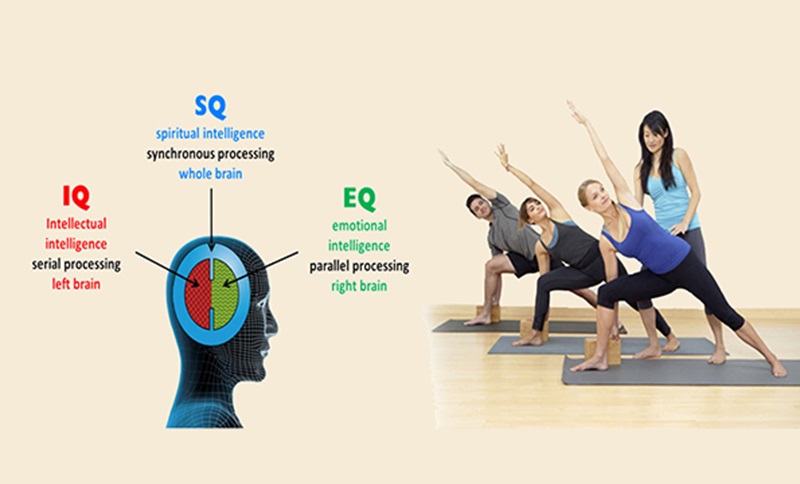Have you ever asked yourself or thought that it is possible to raise the IQ levels in your brain? Surprisingly, it may just be possible if we apply the right kind of training to the intellect. There are various methods that can enhance intelligence quotients, from exercising your brain to changing your daily routines.
In this article, we will discuss effective techniques that can be aimed at improving your resulting scores and potentially increasing your intelligence quotient. With these methods in mind, you can prepare to make yourself smarter.
IQ stands for intelligence quotient; it is a measure of the level of intelligence of a person. It is usually measured by carrying out multiple intelligence tests that focus on such parameters as logical understanding, problem-solving capability, and the ability to comprehend verbal information. Thus, IQ, as a measure of intellectual skills, can affect academic achievement, employability, and problem-solving abilities, though it does not completely determine one’s potential.
Determining your IQ level involves selecting a reputable test, preparing adequately, and understanding the results. Select a well-recognized IQ test. Some of the most reputable IQ tests include:
To answer the question, 'How to increase your IQ?', let's explore some effective strategies and activities that might contribute to improving your IQ.
Some of the most effective activities that help to develop working memory as well as skills in reasoning are word and number games. Memory games are one of the best treatments that healthcare providers suggest for use in handling dementia patients due to the changes in brain dexterity and intelligence quotient that tend to result from such games. Memory activities that you could practice in your spare time to increase IQ include:
Sudoku: This number puzzle game enhances logical thinking and pattern recognition.
Crosswords: These puzzles improve vocabulary and memory recall.
Memory Matching Games: Games that require you to match pairs of cards can enhance visual memory.

There are numerous studies that prove people become smarter when learning a new foreign language.
First and foremost, you can expand your knowledge of new words and grammar patterns, and your concentration and memory are enhanced. Thus, your ability to learn and memorize in other fields will increase as well.
Then, the process of language acquisition makes you more intelligent, especially formal intelligence, as it sharpens skills in reasoning. It also enhances multitasking as the mind is trained to comprehend grammar rules and toggle between two languages.

Playing a musical instrument is an activity that has been linked to increasing intelligence. Research showed that musicians possess a better working memory than those who have not taken music. Playing the piano has also been observed to enhance memory with great influence on verbal memory and develop qualities like concentration and discipline, hard work, and even imagination. Piano playing also had a positive impact on vocabulary, as children who have been able to spend a few years practicing piano could recall twenty percent more vocabulary as compared to other children. This supports the fact that learning to play an instrument enhances working memory in people.
Taking a few hours in a week to spend learning a new piece on your instrument that you want to play for the listeners not only adds another feather to your cap but could also help you raise your IQ score.

Reading books not only helps you broaden your general knowledge but also enhances your verbal reasoning ability. Reading also increases your IQ because it opens and creates new connections in your brain, making you more rational, logical, and intelligent. The process of reading can attend more effectively to our imaginative capacity by encouraging us to open and refine our image-making faculties beyond the real. As a result, an expanded imagination can enhance creativity in the process of working in some or any field, which means that it will be much easier to come up with a completely fresh and unconventional approach to the problems that arise in the ordinary course of life.

Throughout history, many chess players have had exceptional IQ scores. Playing chess can help develop advanced math and critical thinking skills, especially at an early stage of life. Studies show a strong positive correlation between playing chess as a child and academic achievement. In one study, researchers found that students who played chess were more academically advanced overall, particularly in math, nonverbal reasoning abilities, and spatial analysis.
Scientists analyzed the brain patterns of the chess players and found that advanced players have a tendency to use both sides of the brain while making decisions during this game. By exercising both sides, players use the visually focused right side to recognize patterns and the analytical left side to determine the best logical move. This practice strengthens both sides of the brain, enhancing the player's cognitive abilities and making them more advanced and adept thinkers.
Moreover, chess can be especially beneficial for older people, who are recognizable as the Alzheimer’s disease endangered group. Brain cells experience a decline in neuroplasticity as a person grows older, for it is the capacity to alter the connections within the brain. Chess can significantly impact this situation by helping preserve the health of your brain.

Many studies indicate that meditation helps people focus better by tuning out distractions and irrelevant information. This topic has been researched by the Neurofeedback Division of the Association for Applied Psychophysiology. The result showed that patients’ IQ increased on average by 23 percent if they were required to meditate. In fact, mediation enhances blood supply in the brain, patience, concentration, and memory. Moreover, it is so relaxing, as well.
If you spend 30 minutes a day meditating, then it is effective. You may divide it into 10 or 15-minute portions and make 2 to 3 portions a day. It is best done when you wake up, after, or before sleeping.

Exercise is not only good for your health but also improves your mood. The more endorphins you release during exercise, the more active your brain becomes, leading to improved feelings of well-being. Exercise can also enhance memory and thinking skills. According to Dr. Scott McGinnis, an instructor in neurology at Harvard Medical School, there's a significant amount of scientific evidence supporting this claim.
Aim to exercise twice a day for 30–45 minutes, once when you wake up in the morning and once before you go to bed at night. Ideally, follow each exercise session with meditation to train your muscles and rest your mind.

It sounds irrelevant, but sleeping can be beneficial for your brain. Sleep when your body needs to do that. For some people, it may be their most productive time of the day, and their preferred working hours could be, for instance, at 9 in the morning. Some students are at midnight or even at 2 a.m. As each person has different needs, sleep when you want to since the body will remind you of when it needs it.

There is a significant positive correlation between children's IQ and their nutritional habits, regardless of gender. This suggests that children who have better dietary habits tend to have higher IQ scores. Research by Northstone et al. (2011) concluded that poor nutrition and unhealthy dietary habits in early childhood, characterized by excessive consumption of fat, sugar, and processed foods, may lead to a slight decline in IQ in late childhood. Conversely, adopting healthy eating practices and consuming a diet rich in nutrients may be associated with a slight increase in IQ.

Like any other body muscle, the brain can be exercised to be stronger, more flexible, and cleverer. Mental activities are just like physical workouts; they strengthen and sharpen the mind. The IQ test is known to be one of the most effective means to measure and perhaps develop intellectual abilities.
IQ tests cover different aspects of intelligence that include abilities in terms of thinking or reasoning, problem solving, spatial aptitude, and reasonable language usage. These tests are designed to help you know your current cognitive abilities in terms of prowess and limitations, so as to channel your mental exercise accordingly. Also, doing various IQ tests from time to time can train your brain and improve your thinking strategies and problem-solving skills.
So, it’s recommended to take the IQ test to improve the existing state of your brain and enhance your intelligence.

Besides the practical tips to increase your IQ level, it is useful to know what contributes to its decline. Nevertheless, some of these habits may appear completely innocent, but in the long run, they will help decrease their IQ. Here are some activities to avoid:
Excessive screen time: Some negative consequences include poor academic performance and IQ drops as a result of children and teenagers’ prolonged exposure to screens like TVs or various digital devices such as smartphones and computers.
Lack of sleep: Lack of sleep causes your brain to function at a lower level, and therefore you may find it difficult to focus, learn new things, and even retain what has been learned, hence the lowered IQ.
Poor diet: Consuming processed foods, sugars, and unhealthy fats has the potential to affect one’s intelligence quotient as the cognitive functioning of the brain would be compromised. Of great importance is maintaining a healthy diet that includes fruits, vegetables, whole grains, lean protein, and working out regularly.
Lack of physical activity: That means getting active or being physically active is not only good for your bodies but for your brains too. The accumulation of stress as a result of a lack of movement causes impairment of the mind and a reduction in the intelligence quotient.
Stress: Stress has always been known to cause harm to the brain and cognitive ability, meaning that one’s IQ reduces due to the effects of stress. Control and efficient functioning of stress are vital for psychological health; therefore, one needs to engage in physical or spiritual activities like meditating or exercising.
How to increase your IQ after 18?
Many people wonder if IQ can be enhanced after 18. If you want to raise your IQ as an adult, you must involve regular exercise in your lifestyle, make your diet better, consider proper sleep, and develop healthy habits. Try to get a new product and use it to do some thinking, such as puzzles or games, as well as learn some new skills. Eat a well-balanced diet, exercise regularly, and have healthy sleep so as to be able to carry out the planned activities effectively. You can use some practice of mindfulness and stress management to enhance your general attention and processing capabilities.
How to increase IQ to 200?
Raising an IQ score to 200 is nearly impossible, as the highest recorded intelligence quotient levels are within the same range of 200. However, IQ is one of the most multi-faceted indicators and is determined by both heredity and environment. While there is no guaranteed way to achieve such a high IQ score, you can try the aforementioned ways that may help improve your IQ score.
How do you get a high IQ?
While genetics do play a role in determining IQ, you can build and enhance your intelligence by continuously learning and challenging yourself with new information, and exercises can help improve cognitive abilities.
It is possible to raise your IQ through some exercises. Training your memory, changing your diet, and maintaining a healthy lifestyle can help boost your intelligence levels. The most effective method to exercise your brain is to challenge yourself, try to think, play skillfully, study something new, and exercise your brain regularly.